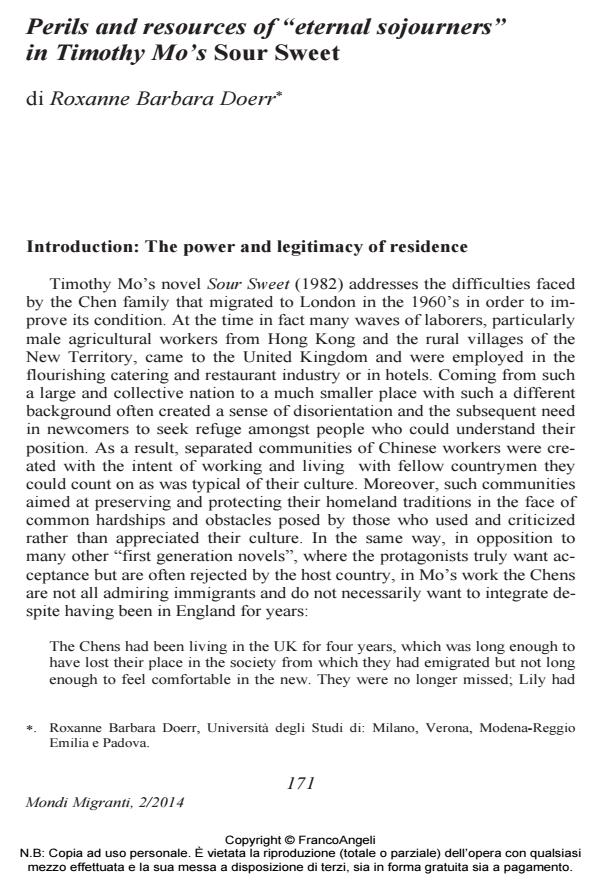Perils and resources of "eternal sojourners" in Timothy Mo’s Sour Sweet
Journal title MONDI MIGRANTI
Author/s Roxanne Barbara Doerr
Publishing Year 2014 Issue 2014/2
Language Italian Pages 28 P. 171-198 File size 125 KB
DOI 10.3280/MM2014-002009
DOI is like a bar code for intellectual property: to have more infomation
click here
Below, you can see the article first page
If you want to buy this article in PDF format, you can do it, following the instructions to buy download credits

FrancoAngeli is member of Publishers International Linking Association, Inc (PILA), a not-for-profit association which run the CrossRef service enabling links to and from online scholarly content.
Timothy Mo’s novel Sour Sweet addresses the difficulties faced by the Chen family that moved to London in the 1960’s in search of a better life. In opposition to many other "first generation novels" however, the Chens are not all admiring immigrants who wish to blend in with their host country; on the contrary, they prefer a ghettoized life in the suburbs and see their new location simply as a temporary rest place. For the Chens and the Triad gang that threatens them the cosmopolitan city is a land of opportunity they can exploit through the commodification of their "superior" culture, making theirs an attempted "reverse colonization". This is accomplished through the preparation and presentation of food by means of which the English often approach the Chinese. At the same time however, in order to sell their food the Chens must adapt their dishes to their clients’ expectations and tastes. Moreover, although the "foreign devils" have not caused them any particular distress, the Chens still regard them with a stereotypical eye that resembles the one through which people like them are commonly viewed. Timothy Mo thus depicts the diaspora experience from an alternative and ironic point of view, that of a family committed to not coming to terms with their new condition unless compelled by the "yin yang" flow of contrasting yet complementary forces and elements that characterize everyday life. The present perusal into the development of the diaspora experience offered in Timothy Mo’s novel will be carried out by focusing on some of the main issues that divide and that unite Chinese immigrants with fellow countrymen as well as from and with their English "home away from home".
Keywords: Timothy Mo, Sour Sweet, Chinese diaspora, immigration to London, Chinese mafia, food studies, multiculturalism.
Roxanne Barbara Doerr, Perils and resources of "eternal sojourners" in Timothy Mo’s Sour Sweet in "MONDI MIGRANTI" 2/2014, pp 171-198, DOI: 10.3280/MM2014-002009